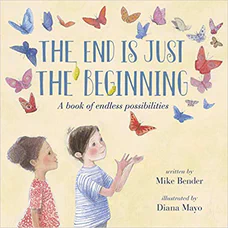The End Is Just the Beginning
Written by Mike Bender
Illustrated by Diana Mayo
40 pages
•
Published 2021 (Crown Books for Young Readers)

Recommended Age Range: Kindergarten through 4th grade.
Publisher's Summary:
A timely message of hope and comfort, this stunning picture book is the perfect treasure to share with anyone trying to navigate these uncertain times—or any life transition! Starting a book at the end may seem confusing. But the end of one thing is just the beginning of something new in this innovative and heartfelt book.

Dr. Annie's Takeaways
Recommended for: This book will likely resonate best with a verbally-oriented child who will understand and connect with the book’s message that all endings are the beginning of something new. This message is actually quite profound and may be reassuring to a child who struggles with endings and transitions (e.g., leaving a playdate, getting a new teacher).
Would a child like it? Some children will really connect with this idea and feel empowered by it. Others might find it a tad bit annoying or too cerebral.
Evidence-Based Practices:
Cognitive Restructuring
Tone: Reflective, encouraging
Story Quality: The premise of this well-written book is that the end of one thing is the start to another. This message could be invalidating or saccharine if it were written differently, but author Mike Bender (notably, also the creator of Awkward Family Photos
and screenwriter of Not Another Teen Movie) manages to make this book feel profound and refreshing. It was published in Spring of 2021, right as the darkest days of the COVID pandemic were ending, and it reminds us that life is full of new chapters and new beginnings.
Illustrations: Lovely watercolor illustrations in soft colors.
Representation: The illustrations feature two friends–a White boy and a Black girl. The text does not mention them; it is written in second person, directly to the reader. There is a page that mentions snow melting in winter, which would only apply to children living in certain climates.
Psychological Practices: This book helps children to reframe endings as the beginning of something new. When applied indiscriminately, this strategy can be invalidating (e.g., “I know you’re sad about your favorite toy breaking, but this is the start of finding a new favorite toy!”). However, it can be a reassuring tool in a child’s coping toolkit (especially if “and” is used rather than “but”), and it’s applicable to many situations. Baseball season ends, and soccer season starts. Second grade ends, and third grade starts. A playdate ends, and a relaxing evening with family starts. It is important to create space for a child’s sadness about endings; with time, they will see the beginnings too.
Concerns: There’s a page that says, “And if you’re really well behaved, the end of dessert might just be the beginning of MORE dessert.” I’m not categorically against food being used as a reward sometimes (e.g., going out for ice cream following a feared vaccination appointment), but I generally discourage parents from using access to food as a reward or punishment. Many families are also moving away from this strategy, so it feels a bit outdated despite the recent publication date.
